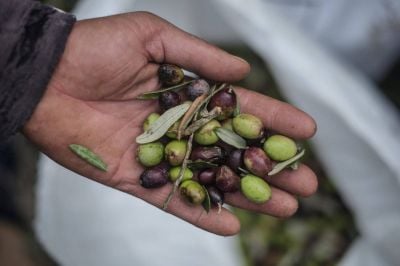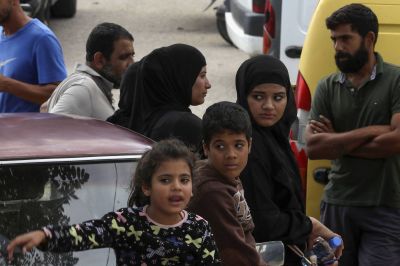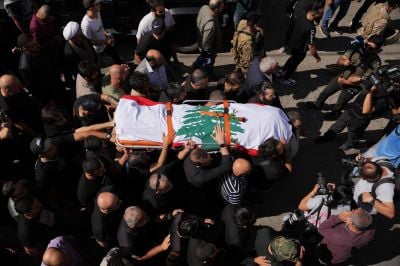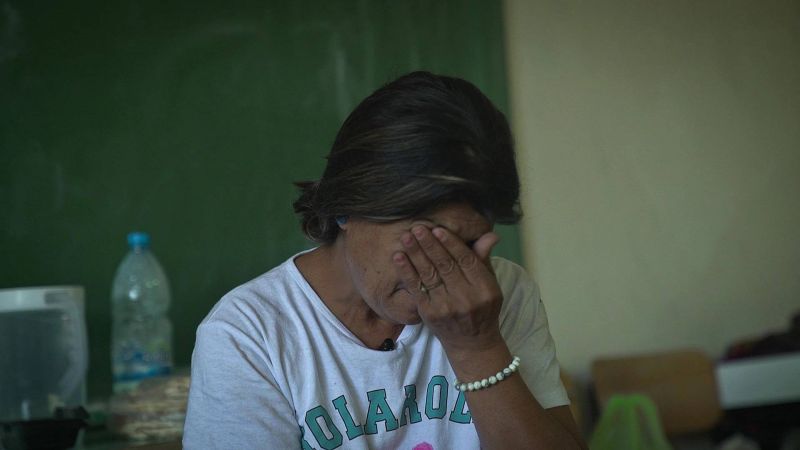
Wafaa, originally from Dhayra, is sheltering in a public school in Sour. (Credit: Lucile Wassermann/L'Orient-Le Jour)
Click here to read our live coverage.
SOUR — “Now, all we can do is wait,” says Ahmad. Crouching on the floor of a technical school classroom in Sour, he prepares an omelet on an electric hob. A tobacco farmer and father of three young adults, 51-year-old Ahmad is now spending his days at the school, except when going for a walk in the playground.
Next to him, Ahmad has stored his entire life — or rather, what he was able to take before fleeing Aita al-Shaab, his village on the southern border, the day after the first exchanges of fire between Hezbollah and Palestinian factions and the Israeli army. Since then, Ahmad has feared he might never be able to return home. He’s also away from his tobacco field. “Without work, I can’t provide for my children,” Ahmad tells L’Orient-Le Jour.
More than 19,000 people have been displaced within Lebanon as a result of “the increase in cross-border incidents” since the start of the fighting, according to a report released Monday by the International Organization for Migration (IOM).
Since Oct. 9, thousands of people from the south, mainly from Dhayra and Aita al-Shaab, have flocked to Sour, says Mortada Mhanna, director of the disaster management unit of the federation of municipalities in Sour. In the space of two weeks, under the leadership of this unit, three public schools were gradually transformed into temporary shelters to house around 1,000 displaced people.
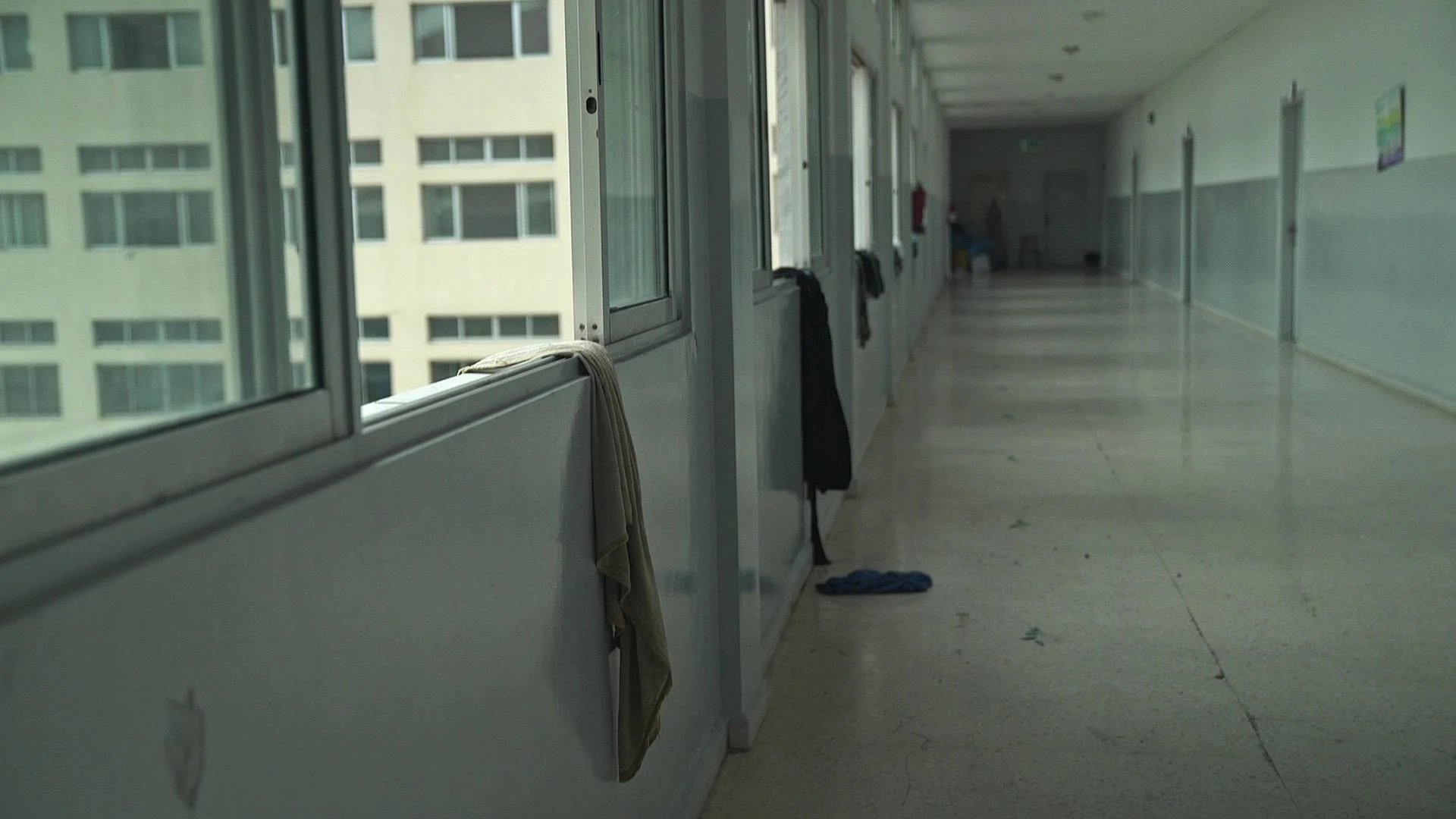 In one of the public schools in Sour transformed into makeshift shelters, laundry hung to dry in the windows. (Credit: Lucile Wassermann/L'Orient-Le Jour)
In one of the public schools in Sour transformed into makeshift shelters, laundry hung to dry in the windows. (Credit: Lucile Wassermann/L'Orient-Le Jour)
“Each classroom accommodates between 15 and 20 people. We’re now looking for a fourth, given the influx of people,” says Mhanna, from his “operations room,” located a few steps away from the technical school where Ahmad has taken refuge.
In order to meet the need for medicines, bedding, food and mattresses, the unit relies on international aid. “We can’t provide everything. For six people, I can only give three mattresses,” Mhanna adds.
Another 4,000 people from the border area are scattered in houses around the city, staying with relatives or people who have taken them in. “For example, we are working with local authorities to house displaced people in empty homes or with local people. But with the economic crisis, this has become more difficult financially for people than it was in [the] 2006 [war],” says Mhanna.
‘What have we done to deserve this?’
Outside the school, under a tree, a group of displaced people are glued to the news over an argileh. “Alma al-Shaab has just been hit!” they shout as a L’Orient-Le Jour reporter enters the premises. Next to them, Walid*, who prefers to remain anonymous for “fear of reprisals,” is on edge. “No one will dare say it, but we hate Hezbollah. If they don’t repair our houses, they’ll be in trouble,” says this farmer from Dhayra, a Sunni village near the border.
In the courtyard, another man comes and goes, pushing a stroller. A few meters away, Wafaa Darwish, a woman in her 50s, is mopping the floor of the classroom where she is staying with 11 members of her family. Mattresses and folded sheets lie on desks against the wall.
“What have we done to deserve this?” Darwish says. She has stored away the meals that are distributed to the displaced people in the morning, noon and night. Originally from Dhayra, Darwish fled on the third day of the fighting. But she is particularly worried about the $800 she borrowed from an acquaintance some time ago. “What am I going to do now?” asks this olive grower, now that the harvest season has begun. “I was counting on this to give her the money back!” As the conversation goes on, her throat begins to close up. “We work so hard and get nothing in return. Since the crisis, nobody’s looked at us. Neither the government nor the Arab countries,” she says. “Our dignity has just been destroyed,” she says.
A few minutes’ drive from the technical school, in another school also housing hundreds of displaced, Fatima*, from Naqoura, is out of breath as she climbs the three flights of stairs to her “temporary room.” Her neighbor Emné*, from Jibbein, joined her there to confide in her. She is still shaking from the strikes on her village. “I left because I live next to a Hezbollah center,” she says. Both women have left their sons behind. “For work,” says Fatima. One is a civil servant. And the other? “He’s with Hezbollah. I can’t be any clearer,” she adds.
‘Our life is a misery’
Less than three kilometers away from Sour’s public beach, in a third school, the laundry has been hung out to dry in the windows. At the entrance, a man approaches L’Orient-Le Jour’s reporters asking why they’ve come there. In a scout uniform and T-shirt bearing the logo of the Amal Movement’s Rissala Islamiya, he leads the way to the rooms of the new residents.
“They’re the only ones who help us,” says Wansam, from Aita al-Shaab. His son Mahmoud, a farmer in his 50s, has had to give up his falafel snack bar, the sole source of income for this father of eight children aged between 13 and 24. “Our life is a misery. Since I was born, it has been punctuated by wars,” he says. He says he blames the Palestinian presence in Lebanon for the fighting. “I want to tell the truth, even if I’m going to be frowned upon, but since the Palestinians arrived, our life has been one of displacement and anxiety,” says Mahmoud. He was also forced to flee in 2006, when a month-long war between Israeli forces and Lebanese Hezbollah devastated parts of the south. “Our village was razed to the ground. We can't take it anymore. We are being targeted by this Israeli beast because we are carrying someone else’s burden.”
Just next door, in the same village, Mahmoud, a 60-year-old diabetic with a heart condition, is exhausted. Not just from the escape, but also from looking after his son, who has autism and needs attentive care.. “When we wanted to leave, he wouldn’t listen to us. Here, I can’t take my eyes off him. He left the premises and we had to look for him. He has to be placed in a center... No one looks at the poor,” he says as his wife breaks down in tears. “The children are afraid to go near him,” says a volunteer. Mahmoud has been asking for help for years, to no avail. “Yes, we want to go home, but even if this crisis passes, it won’t solve our problems.”
*Some first names have been changed and surnames omitted at the interviewees' request, to protect their identities.
This article was originally published in French in L'Orient-Le Jour. Translation by Joelle El Khoury.
Correction: A previous version of this article erroneously spelled the name of Mortada Mhanna, director of the disaster management unit of the federation of municipalities in Sour, as Mortada Mohanad.
